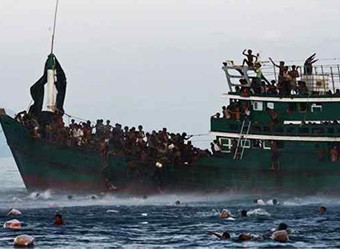One year after the U.S. removed decades-long trade sanctions against Myanmar, the booming developing economy looks set to re-enter Washington’s bad side.
In a statement released late on Monday, the U.S. State Department said it was considering “economic options” to target individuals associated with atrocities against Myanmar’s Rohingya Muslims. Washington is also “exploring accountability mechanisms available under U.S. law, including Global Magnitsky targeted sanctions,” the State Department added, referring to penalties specifically targeted for human rights violations.
The world’s largest economy is also consulting with allies on accountability options, the statement continued.
The notice comes a week after more than 40 lawmakers in the U.S. House of Representatives called for action against Myanmar’s military leaders. Despite the nation’s return to civilian rule in 2015 and the installation of Nobel laureate Aung San Suu Kyi as defacto leader, the army still commands great control over governmental affairs.
Rohingya Muslims, based in Myanmar’s northern Rakhine province, have suffered horrific violence in recent months in the Buddhist-majority country. The assailants, reports say, have included security forces and non-state actors. The ongoing brutality has been deemed ethnic cleansing by the United Nations and has sent nearly one million Rohingya Muslims to neighboring Bangladesh in what has become one of Asia’s most serious refugee plights.
A re-imposition of U.S. sanctions could drastically hurt the country’s economic transformation. The former pariah state marked a milestone last year when it was officially declared sanction-free, a move that facilitated integration into the global economy as well as fresh investment.
Washington first began easing sanctions on the former military dictatorship in 2012 and removed tight rules against several state-owned enterprises early in 2016 before lifting every penalty in Oct. 2016. As a result, Myanmar has become one of the world’s hottest frontier markets, and is now home to several multinationals including Nestle, Coca Cola, and Visa.
Activists have long demanded the West to take action against the country in order to pressure the military junta.
“The time has come to impose hard costs — targeted sanctions and other punishments — that bring real world practical or financial harm to Burma’s senior military command,” John Sifton, Asia advocacy director at Human Rights Watch, said in a recent note.
In addition to targeted sanctions, arms embargoes would also be effective, Amnesty International said in a note last week.
The White House has already rescinded invitations for Burmese security forces to attend U.S.-sponsored events and prevented all units involved in Rakhine operations from participating in U.S. assistance programs, according to the State Department.
Source: CNBC


